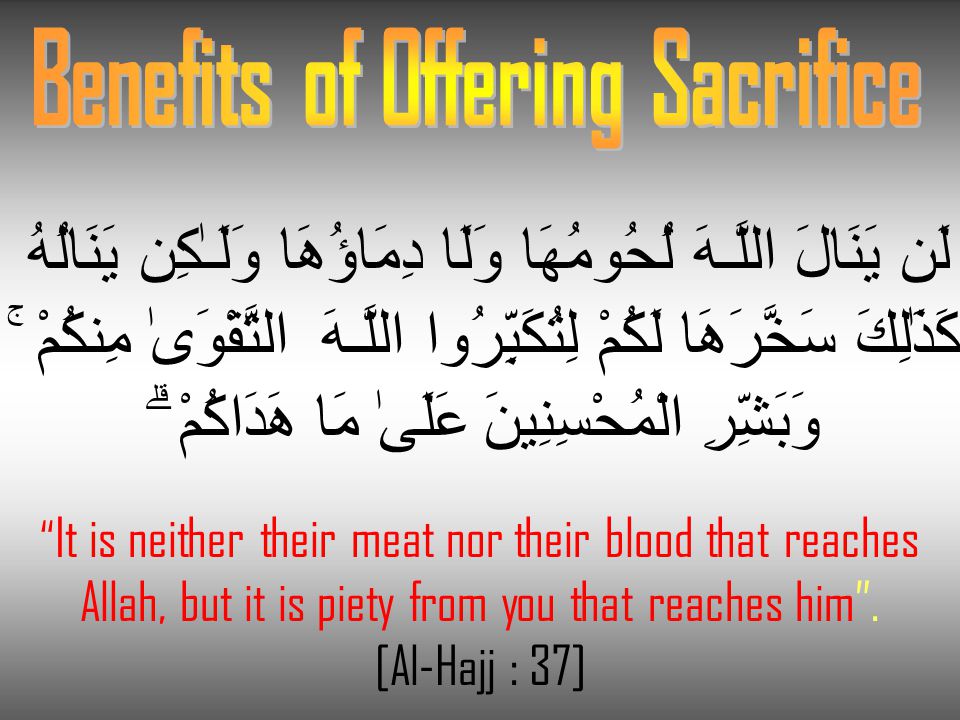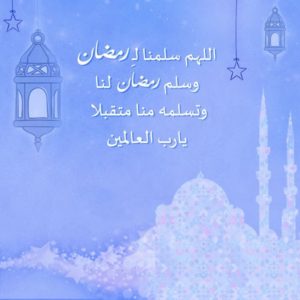
Jaamia Madinatul Uloom DARUL IFTAA (Department of Islamic Jurisprudence)
EID – UL-ADHAA 1445/2024
Virtues and importance of Qurbaani (Udhiya)
Qurbaani is the sacrifice of an animal for the sake of Allah, during the stipulated days of sacrifice. In Islam Qurbaani is a very important and virtuous act of worship.
- The Messenger of Allah ﷺ said: There is nothing dearer to Allah during the days of Qurbaani than the sacrificing of animals. The sacrificed animal shall come on the Day of Judgement with its horns, hair, and hooves (to be weighed). The sacrifice is accepted by Allah before the blood reaches the ground. Therefore sacrifice with an open and happy heart. (Tirmidhi)
- Zayd Ibne Arqam (R.A.) relates that the Companions (may Allah be pleased with them) asked, “O Rasoolullah! What is Qurbaani?” He ﷺ replied: “It is the practice of your father Ibraheem (A.S.).” They asked again, “What benefit do we get from it?” He ﷺ answered, “A reward for every hair (of the sacrificed animal). They asked, “And (what reward is there for animals with) wool, O Rasoolullah?” He ﷺ replied: “A reward for every fibre of the wool.” (Ibn Mājah)
- The Messenger of Allah ﷺ said: “Whoever can afford to offer a sacrifice but does not do so, let him not approach our place of prayer.” (Ibn Mājah)
NISAAB- $44,050.TTD (gold) (Calculated on 09/05/2024) Silver: $3,650.tt
Upon whom Qurbaani is Waajib (compulsory)
• Qurbaani is waajib upon every baaligh (mature) and sane individual who, during the days of Qurbaani, possesses the wealth amounting to the Nisaab (surplus to his needs and after deducting his liabilities) and is a muqeem (i.e. not a traveller).
NB: It is not necessary the Nisaab amount (for Qurbaani) be in one’s possession for a complete year. It’s possession during days of Qurbaani will make sacrifice obligatory. Non zakaatable assets in excess of one’s needs will also be included when determining one’s wealth totalling the Nisaab.
•The waajib Qurbaani will not be valid if it is carried out on behalf of someone without his consent, but if it is a nafl (optional) Qurbaani then it will be valid.
• Each Baaligh member of a family who owns the above-mentioned nisaab must carry out his or her own Qurbaani separately. If Baaligh children live with their parents, Qurbaani is obligatory on each one of them who owns the Nisaab. However, a husband or father, apart from offering his own Qurbaani, may offer a separate Qurbaani on behalf of his wife or child, with their permission.
• If one has been favoured by Allah with wealth, then he may perform Qurbaani on behalf of Rasoolullah (ﷺ) as well. One may also include and all those living or deceased relatives, friends and teachers who have conveyed Deeni knowledge or been a cause of benefit to one.
The Time of Qurbaani
• The time of Qurbaani commences after Eid Salaah on the 10th of Zul Hijjah and ends just before sunset on the 12th of Dhul Hijjah.
• Qurbaani is permissible during the night if is carried out in a place well lit and there is no fear of erring.
• If Qurbaani becomes waajib upon a person (by possessing the nisaab) before sunset on the 12th of Zul Hijjah then he must slaughter an animal, otherwise he must do Qadha. (Explanation on page 3)
• It is more virtuous to slaughter on the 10th of Zul Hijjah (day of Eid), then the next day, then the next day.
• One may have hisQurbaanidone in another country. The time for Qurbaani in the country where the animal is being sacrificed will be taken into consideration, not the country in which the person is present.
The Animals of Qurbaani
• Goats, sheep, buffaloes, cows, oxen and camels can be slaughtered for Qurbaani,(male & female).
• Goats and sheep must be at least one year old. However, if a sheep aged 6 months or more and looks like a one year old in size, then it can be sacrificed.
• Bulls, buffaloes, cows and oxen must be at least two years old. Camels must be at least five years.
• There are up to seven shares in a buffalo, cow, ox and camel.
• If a person upon whom Qurbaani was waajib purchased an animal and was not able to slaughter it during the three days of Qurbaani, then must give the live animal in Sadaqah. (Charity)
• There is only one share in a goat and a sheep.
• It is permissible to slaughter a castrated animal for Qurbaani.
• There is no dislike in slaughtering a female animal. It is also permissible to slaughter a pregnant animal. The young should also be slaughtered. If it was not slaughtered during the days of Qurbaani then it should be given alive in charity.
• It is better to purchase a Qurbaani animal which has more meat compared to an animal which has less meat. However, preference should be given to the quality of the meat, since the purpose of Qurbaani is also to eat from its meat.
• It is virtuous to purchase the animal for Qurbaani a few days prior to slaughtering and to feed and fatten it.
• The intention of all shareholders in a Qurbaani animal must be for worship of Allah and seeking His reward, and not only for the meat.
• A shareholder can make intention of doing Aqeeqah.
Sunnah method of Qurbaani
• It is more virtuous for the owner to slaughter his Qurbaani animal himself. If he does not know how to slaughter, then he may appoint someone to slaughter on his behalf, however he should try to be present at the time of slaughtering.
• It is not necessary to make a verbal intention at the time of Qurbaani, however it is necessary to say Bismillahi Wallahu Akbar when slaughtering.
• If the slaughterer (unintentionally) forgets to recite Bismillah then the animal will still be halaal and the Qurbaani will be valid.
• One should use a sharp knife and slaughter the animal quickly so that it does not suffer, but do not sharpen it in front of the animal.
• One should avoid slaughtering an animal in the view of other animals.
• One should not commence the skinning until the animal is cold and there is no sign of life left in the body.
• The animal should not be slaughtered with such force that the head is severed completely or the knife reaches the spinal cord.
• Stunning the animal before slaughtering should be avoided.
• The animal should not be dragged to the place of slaughter and must not be ill-treated in any way.
• The Masnoon method for slaughtering is that the animal should be placed on its left side, facing towards the Qiblah.
Before grounding the animal, it is Sunnah to recite the following dua:
إِنِّي وَجَّهْتُ وَجْهِيَ لِلَّذِي فَطَرَ السَّمَوَاتِ وَالأَرْضَ حَنِيفًا وَمَا أَنَا مِنَ الْمُشْرِكِينَ. إِنَّ صَلاَتِي وَنُسُكِي وَمَحْيَايَ وَمَمَاتِي لِلَّهِ رَبِّ الْعَالَمِينَ. لاَ شَرِيكَ لَهُ وَبِذَلِكَ أُمِرْتُ وَأَنَا مِنَ الْمُسْلِمِينَ . اللَّهُمَّ مِنْكَ وَلَكَ
Inni Wajjahto Waj’hiya Lilladhi Fataras Samaawaati Wal’arda Haneefaw Wamaa Anaa Minal Mushrikeen. Inna Salaati Wa Nusooki Wa Mah’Yaaya Wa Mamaati Lillahi Rabbil Aalameen. Laa Shareeka Lahu Wa Bidhaalika Umirtu Wa Anaa Minal Muslimeen. Allahumma Minka Wa Laka.
“I have truly turned myself towards that Being who has created the heavens and the earth and I am not from those who ascribe partners to Allah. Verily, my worship and my sacrifice, my living and my dying are for Allah Ta’ala, Lord of the worlds. He has no partner, with this I have been commanded and I am from the Muslims. O Allah! This sacrifice is from you and it is for you.”
• Apart from the above mentioned dua, at the time of slaughtering one should recite: Bismillahi Wallahu Akbar
Defects that will render an animal Unsuitable for Qurbaani
• Its eyesight being severely impaired.
• The animal was born without ears.
• More than one third of its tail or ears is cut off.
• The horn is broken off from the root. If however, the animal was born without horns it would be permissible to use.
• Lameness in a leg. If the animal walks on three legs and does not take support from the lame leg, then it will not be suitable for Qurbaani. If it takes support from the lame leg, it will suffice.
• The animal is so frail and weak or sick that it cannot walk to the place of sacrifice.
• The animal does not have any teeth and is unable to graze. However if it is able to graze it will suffice for Qurbaani.
•If a defect was created in the animal while taking it to the place of slaughter or while grounding, it then there will be no problem with this Qurbaani. This injury will not be considered and will not invalidate the Qurbaani.
The Meat and Skin of the Qurbaani Animal
• The Qurbaani meat can be kept for one’s own use, but it is better to divide it into three parts: one for the family, one for relatives and friends and one for the poor and needy.
• If the Qurbaani animal is milked then the milk, should be given to the poor. If consumed, then its value should be given in charity.
• It is not permissible to sell any part of the animal whatsoever.
• The skin of the Qurbaani animal may be used for one’s personal needs, or be gifted or given way in charity.
• It is not permissible to give part of the animal as payment to those employed in slaughtering or skinning.
• If a deceased made a bequest that Qurbaani should be done on his behalf (from one third of his wealth), then all that meat has to be given in charity. However if one made the Qurbaani on behalf of the deceased from his own personal wealth, then that meat may be consumed.
• It is necessary for the shareholders to distribute the meat among themselves equally, by weight, not by mere estimation and pieces of liver should be placed in each share.
• Qurbaani meat may be given to non-Muslims.
•The following parts of an animal are unlawful to consume:
Flowing Blood, Male And Female Genitals, Testicles, Bladder, Glands Or Tumours, Gall Bladder (Bile).
Making Qadha of missed Qurbaani
• If a person upon whom Qurbaani was waajib did not make Qurbaani and the days of Qurbaani passed, then he will have to give an animal or its value in charity.
• If a person missed waajib Qurbaani during previous years then he must give an animal or its value to the poor, with the intention of Qadha of Qurbaani, for each year’s missed Qurbaani
The 1st Ten Days of Zul Hijjah
• The merits of the first ten days and especially nights of Zul Hijjah are mentioned in the Quran and in many Ahadeeth. We should try to avail ourselves of these great virtues by increasing our Ibaadat during these days and nights.
• It is mentioned in a Hadith regarding the fasting on the 9th:
“Fasting on the day of ‘Arafah expiates the sins of the previous year and coming year.” (Muslim)
• Extra effort should be made to fast on this day and to spend a portion of the night preceding Eid in the Ibaadat of Allah.
• It is mustahab (desirable) for one who intends to perform Qurbaani to refrain from cutting hair or clipping nails from the 1st till the 10th Zul Hijjah, (i.e. until his animal is slaughtered).
• It is not permissible to fast on 10th, 11th, 12th, 13th of Dhul Hijjah as these are days of feast &enjoyment.
Takbeer-ut-Tashreeq
اَللهُ أكْبَر اَللهُ أكْبَر لَا إلـَهَ إلّا اللهُ وَاللهُ أكْبَر اَللهُ أكْبَر وللهِ الحَمْد
Allahu Akbar, Allahu Akbar, La Ilaha Illallahu, Wallahu Akbar, Allahu Akbar Wa Lillahil Hamd.
• From Fajr on the 9th of Dhul Hijjah until the Asr Salaah on the 13th it is Waajib on each Muslim to recite the Takbeer-ut-Tashreeq once after every Fardh Salaah, whether the Salaah was performed individually or in congregation.
• Men should recite it audibly, women should recite it softly.
Some Sunnahs of Eid Day
• To wake up early in the morning and pray the Fajr with Jamaat in the masjid.
• To take a bath and clean one’s teeth with a miswak or brush.
• To take bath and put on one’s best clothes.
• To apply itr (perfume).
• If is preferable that the first thing (food) a person partakes of on this day is the meat of his animal.
• To leave early and go walking to the Eid Salah (if it is close).
• To recite the Takbir ut Tashriq audibly (men) while going to the Eid Salaah.
• It is disliked to perform supererogatory (nafl) prayers before the Eid Salaah in the Eid prayer area or one’s house.
• To use different routes to and from the place of Eid Salaah.
• Being occupied in Qurbaani should not cause one to be negligent of his other duties to Allah (e.g. Salaah in Jamaat etc.)
• On the day of Eid one should extend greetings and good wishes. It is advisable to greet with the following words: تَقَبَّلَ اللَّهُ مِنَّا وَمِنْكُمْ Transliteration: Taqabbalallahu minna wa minkum Translation: May Allah accept from us and you.
For further clarification and inquiries please contact:
Darul Ifta Jaamia Madinatul Uloom
(Department of Islamic Jurisprudence for Guidance in Islamic law, Personal, Social and Business related matters.)
Website- www.fatwa-tt.com Email; jmudarulifta@gmail.com PH# 368-0010, 306-9093, 397-7667
JAAMIA MADINATUL ULOOM
Institute of Higher Islamic Knowledge & Secondary Education
Stadium Link Road, Marabella, Trinidad, West Indies
“If Allah wills goodness for someone, He bestows upon him sound understanding of the Religion.” (Bukhari)
Admission is open for the new school year that begins in September 2024 (Ages 11+).
Boys & Girls (separate facilities)
AALIM COURSE: A 6-year comprehensive study of: Proper recitation of the Holy Quran, the Arabic language, Fiqh (detailed Islamic jurisprudence), History, A’qeedah (Islamic beliefs), Tafseer (Quranic exegesis), The 6 major books of Hadeeth in detail.
HIFZ COURSE: Memorization of the entire Holy Quraan with proper Tajweed.
CSEC (CXC) subjects: Mathematics, English, Social Studies, Integrated Science, P.O.B, I.T & Arabic.
Many extracurricular activities. CVQ Vocational courses, gym, outdoor sports etc.
Tarbiyah. Learning Islamic values in a safe and comfortable holistic Islamic environment.
Al Faadhil/Faadhilah Course: A part time Course (online)inclusive of a Level 1 and Level 2 in depth understanding of the Arabic Language and Islamic Studies (Fiqh-All pillars of Islaam, Seerah-History, Aqeedah, Quraan, Arabic language) for both Males and Females.
————————————————————————————————————————– For information contact: 683-9289 ,397-7667,306-9093 ,368-0010 Email: jmutt@hotmail.com http://jaamia.net


